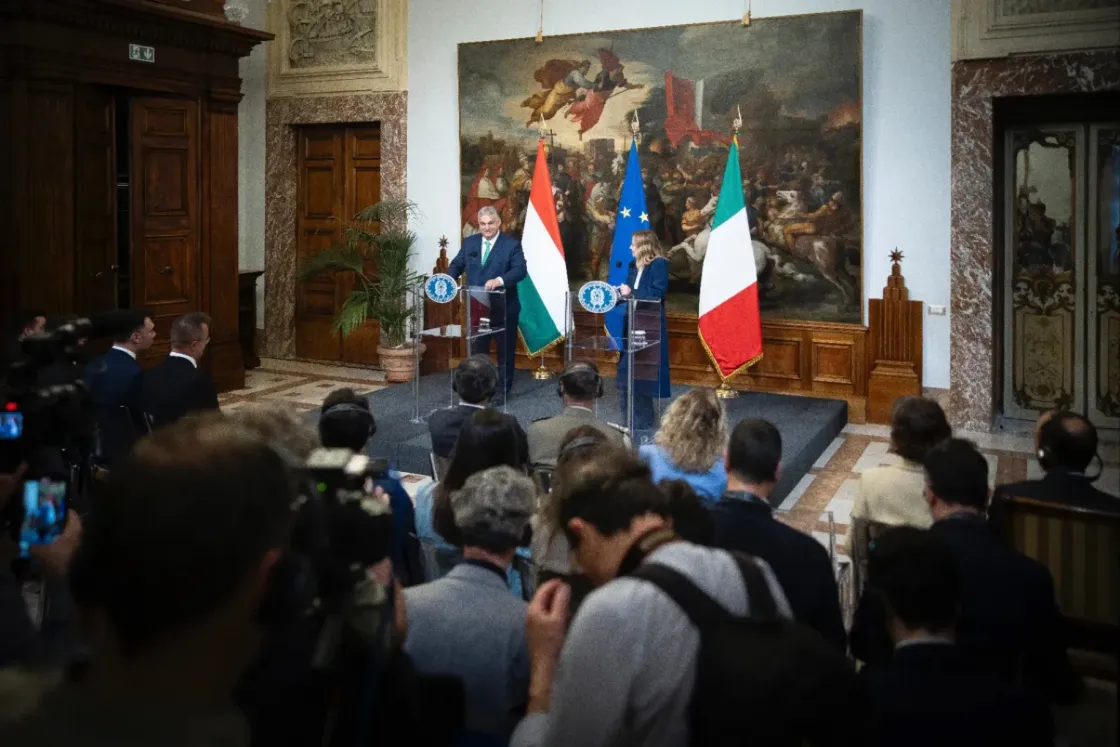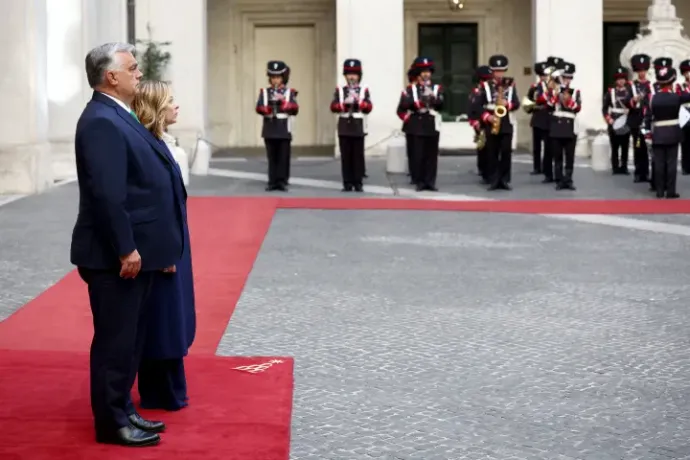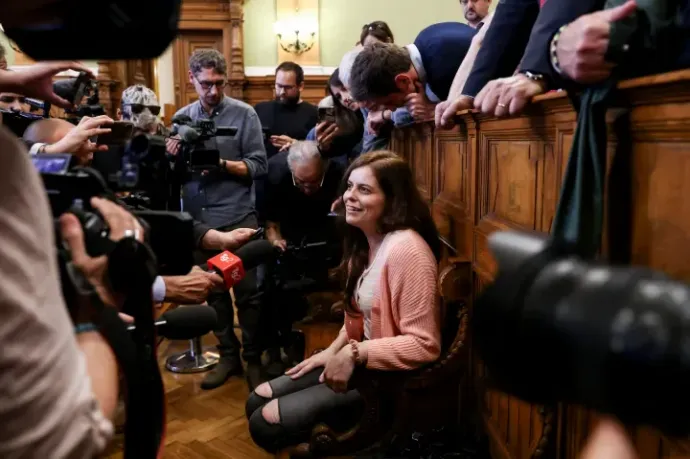Will Meloni and Orbán continue their drawn-out arm-wrestling or will they unite their forces?

"In these difficult times, more than ever, we need friends who share our vision and the same approach to Europe's challenges", "Long live the Hungarian-Italian friendship!" – these were the words with which Balázs Orbán, (no relation to the PM) the Hungarian Prime Minister's Political Director congratulated Giorgia Meloni, when a coalition made up of more moderate and more extreme right-wing parties, led by her won the Italian elections in September 2022.
In the two years that have passed since then, however, the expectations of the Hungarian governing parties have not been fully met – to say the least (our previous, more detailed article on how the great Italian-Hungarian embrace failed to materialize can be found here). Not only did Meloni not walk arm in arm with Orbán over the past two years, but she voted against him on several key issues – for example on the partial suspension of funds for Hungary related to the rule of law procedure. While Meloni has – instead of conflict -aligned herself with the mainstream on a number of issues, Orbán chose not to do that.
Ukraine and Russia
Despite their many areas of agreement, the two leaders took different positions on a number of issues. They easily found common ground on issues such as the promotion of the traditional family model. On immigration, however, despite ideological similarities, their interests have often been at odds. The difference is well illustrated by the fact that the Italian government voted in favour of all the key elements of the EU asylum package, while the Hungarian government voted against all of them.
Meloni has repeatedly lashed out against the Russian president's aggression on Ukraine and has continued the arms exports to Ukraine started by her predecessor. She has also supported the sanctions against Russia, which Orbán has repeatedly labeled as completely misguided, although the Hungarian government has nevertheless given the go-ahead to every unanimous decision on the matter. At a joint press conference with Orbán in Rome at the end of June, Meloni said that she appreciates Hungary's stance in the EU and NATO. A few sentences later, however, the Italian prime minister said that their positions on the Russia-Ukraine conflict are not always aligned.
Obviously, if an initiative gives hope for peace and diplomacy, then so be it, "she said a few weeks later, commenting on Orbán's visits to Russia and China following his visit to Kyiv. At the same time, she also stressed that Orbán had no EU mandate to do so and that "if the next day the signal is that a children's oncology hospital is being bombed, it shows that Russia does not really want dialogue". Typically, when reporting on her sentences ,La Repubblica claimed that Meloni had criticized Orbán, while ( the Hungarian pro-government) Magyar Nemzet, when reviewing the Italian article, came to the conclusion that Meloni was in favour of the visits.
When it comes to Ukraine, Meloni has been able to play the good cop, for example, by softening up Orbán on the €50 billion aid to Ukraine, convinving that he would benefit more in the long run if he let go of the veto. According to the New York Times' detailed account, Meloni and Orbán discussed the deal sitting in green velvet armchairs over a bottle of champagne.
Meloni's pro-Ukrainian stance has not faltered since. For example, at the June peace conference held in Switzerland without the Russians, she strongly criticized Russian President Vladimir Putin's peace plan. Orbán, on the other hand, has identified the victory of the "pro-peace camp" as the stake of June's EP elections and has been openly flattering former US President Donald Trump, the current Republican presidential candidate, who is expected to end military aid to Ukraine if elected.
Meloni and Orbán were the only two member state leaders to vote against the re-election of European Commission President Ursula von der Leyen – but while Orbán said no to the German politician's re-election, Meloni abstained and they subsequently attempted to bring her into the deal on the top EU jobs.
Instead of bringing unity, Orbán's new group resulted in the further fragmentation of the radical right
Although they did meet on the sidelines of the informal EU summit where the decision was being prepared, they did not announce any joint action against the centrist parties' deal. After the meeting, Italian newspapers reported that Meloni had rejected the inclusion of Fidesz in the European Conservatives and Reformists (ECR) group in the European Parliament. Meloni chairs the party family behind the group. According to the paper, neither the Finnish Party, nor the Belgian New Flemish Alliance, nor the Czech Civic Democratic Party (ODS) or the Swedish Democrats – among others – wanted Fidesz among their ranks, as their previous statements also made that clear.
It is unclear whether Minister at the Prime Minister's Office Gergely Gulyás was referring to the Czech governing party, the Finnish governing party or the biggest Flemish party when he spoke about small parties with one or two seats that had just barely made it to the EP, but in the end, Fidesz politicians cited the inclusion of the extremist Romanian AUR party as a reason for their decision not to join.
On his arrival at the informal summit, however, Orbán also held talks with the former Polish and Slovenian prime ministers, which were not justified by the meeting of heads of state and government, as the two were not present there. His Polish negotiating partner, Mateusz Morawiecki, confirmed after a few days that they were discussing the creation of a new parliamentary group. All of this even though his party, Law and Justice (PiS), had been one of the pillars of the ECR and the second largest member of the group since the EP elections in June, which meant that Orbán was trying to lure away one of the biggest delegations from Meloni.
In the end, this did not work out, but the third largest delegation in the ECR, the Spanish Vox did defect, helping the Orbán-led Patriots for Europe (PfE) take over third place from Meloni’s group. Meloni's Italian coalition partner Matteo Salvini's League – along with almost all the remaining members of his former group Identity and Democracy (ID) also ended up in the PfE, which did nothing to dispel suspicions that all of this was really about the relabelling and the expansion of the ID. (The ECR could only console itself with one former member of the ID joining their ranks.)
The maneuver may have been an attempt by the members of ID to break out of the quarantine which the centrist groups had used to exclude them from senior EP posts. The center-right EPP, of which Fidesz was a member until 2021, has extended the restriction to the PfE, but not yet to the ECR. A spokesman for the Eurosceptic group spoke out against the quarantine, but noted with a moderately frank smile that the Vox MPs had been lured over, while Meloni's face at the mid-July NATO summit in Washington perhaps described the relationship even better. After their "defection", Vox president Santiago Abascal said that Meloni et al would remain their "friends and allies".

From prison to the EU
Another interesting episode in the relationship between Meloni and Orbán is the case of the Italian anti-fascist activist Ilaria Salis, who the Hungarian authorites charged with three counts of attempted assault and membership in an extreme leftwing organisation (after arresting her at a counter-demonstration to a neo-Nazi rally in Budapest).
The case became a diplomatic scandal, with Italian press reports claiming that during a January meeting between the two leaders, Orbán had to assure Meloni that Salis' rights would be respected in Hungary. However, this did not appease Megafon's influencers, who were quick to lash out at the Italian prime minister.
The Italian teacher's family and one of her former cellmates also complained that she was being held under unacceptable conditions in her Hungarian prison. At the end of January, the 39-year-old woman was brought before the court in handcuffs and shackles, sparking outrage in Italy.
The Hungarian government flatly rejected the accusations and, speaking on Italian public television, the Hungarian ambassador to Rome called the accusations that the Italian antifa activist was being treated inhumanely in prison slander. After several Italian opposition parties accused their government of not doing enough to bring Salis home, even Foreign Minister Antonio Tajani had to speak up at the Italian Parliament. In the Italian opposition’s opinion, Meloni's government had not acted "in the best interests of the accused nor in the best interests of Italy".

The Italian Green-Left Alliance then fielded the anti-fascist teacher from Monza in the EP elections in order to secure immunity for her. The leaders of the left-wing party later admitted that Salis's case was one of the reasons for their 6.6% result this year, which got the teacher into the EP. She was released a few days later, the proceedings against her were suspended and she was allowed to return to Italy. She spent a total of 15 months in prison in Hungary.
Salis' immunity will last for the duration of her five-year mandate. The Hungarian authorities have the right to request that the EP specialized committee waive her immunity, which they did, as soon as Salis was freed. The proceedings in Hungary can only continue if the relevant committee decides to waive her immunity.
Ideologically close, but far apart
According to Francesco Galietti of the Rome-based political consultant firm Policy Sonar, despite their differences, the good relationship between Orbán and Meloni is rooted in ideology. The analyst also pointed out that the possible return of Republican presidential candidate Donald Trump to the top job in the US could strengthen Meloni's role through her connection with Orbán. The former US president is admittedly a big fan of Orbán, and Meloni could then be seen as being close to one of Trump's favourite European politicians.
Others suggest that Meloni could also benefit from Orbán's friendship at home, where the Hungarian prime minister is popular with a section of the Italian electorate. At the same time, of course, this also provides a platform for those who reject Orbán: Meloni's closeness to the Hungarian prime minister, for example, was a recurring theme during the Italian election campaign.
It is also worth remembering that Orbán has traditionally had good relations with the Italian right: back in the late 1990s he had an excellent relationship with the populist former Italian prime minister Silvio Berlusconi, and it was during the 2015 refugee crisis that he became very close with the radical right-wing Matteo Salvini, who was just coming into his own at the time.
Berlusconi's Forza Italia and Salvini's Lega have since become minority members of the Meloni-led government. However, from this line-up, it is precisely Meloni with whom Orbán is probably the least in tune. On the one hand, there is the personal sympathy that was demonstrably present between Berlusconi and Orbán, and which likely exists between Salvini and Orbán too. By contrast, even after many meetings between Meloni and Orbán, other than the fact that there are some issues on which they are in agreement, nothing more has emerged about their relationship.
On the other hand, there are the aforementioned differences on foreign policy. Although Meloni's Brothers of Italy have repeatedly spoken out against the EU in the past, it was expected even before the recent elections that Meloni, who is eager to receive EU funds, would refine her previously Eurosceptic rhetoric, just as it was known that she would represent the most Atlanticistic foreign policy line in the prospective government coalition.
The extent of the softening, however, may have surprised many international observers. Meloni has held successful negotiations on issues such as pan-European industrial cooperation with a number of foreign leaders, ranging from Spanish Socialist Prime Minister Pedro Sánchez to French President Emmanuel Macron.
Despite all this, Meloni is still considered Orbán's closest ally within the EU's truly great states. However, Galietti has also warned that in the long run Meloni's friendship with Orbán could actually hold her back: "She's holding her own, but in the long run Orbán is an embarrassment to Meloni."
Will they hug it out?
Although the Hungarian prime minister was previously very vocal about his plans to unite the forces of the European right, there are now three groups of the more radical right, instead of two. In any case, Orbán was very confident in saying that he planned to make the PfE the third and then the second largest group in the EP. The former was already achieved with MEPs recruited from the ECR at the time of the PfE's formation, and for the latter to happen,
the easiest solution would be to have the ECR merge with the PfE: the two groups have 162 MEPs in total, which would put them comfortably ahead of the Socialists who only number 136.
Hungarian government politicians have been regularly voicing their belief that if Donald Trump should win the US presidential election on 5 November, there would be peace in Ukraine. If this were the case (which is a big if for several reasons), the most divisive issue between Meloni and Orbán would disappear, so by this logic one can understand the hope.
It is also possible that the Italian PM will get fed up. It was obvious that she was hurt by the fact that she was left out of the distribution of the senior EU posts and that she was supposed to only be told about the decisions after the fact. She also got upset about the European Commission's recent report on the rule of law, and said that the document's findings had been manipulated by part of the Italian media.
But her relationship with the centrist parties could improve if the Italian government's expected candidate for commissioner, Raffaele Fitto, is given an important territory by Von der Leyen when she distributes the posts, and it seems that so far, Meloni's approach on the domestic front has also worked well for her. Polls show her party, the Brothers of Italy still comfortably in the lead, while the more extreme Lega, which is in alliance with Fidesz does not seem to be losing ground in the popularity race. As outgoing ECR MEP Jan Zahradil explained to Politico, although the group would have become larger if Fidesz had been included, this could have caused problems for Meloni at home. "Let's say that the Italian prime minister acted responsibly, in the interest of her country", but that doesn't rule out them "getting closer over the next five years".
However, the situation could also be further complicated by the fact that, as Euractiv reported, citing Polish newspapers
Morawiecki is reportedly keen to take over the ECR presidency from Meloni.
Sources say the Italian prime minister would like to stay on, but there are serious negotiations going on and there is a 50-50 chance of either outcome. If Meloni were no longer president of the ECR, but only the leader of its main member party, it would for sure diminish her position on the European stage.
For more quick, accurate and impartial news from and about Hungary, subscribe to the Telex English newsletter!